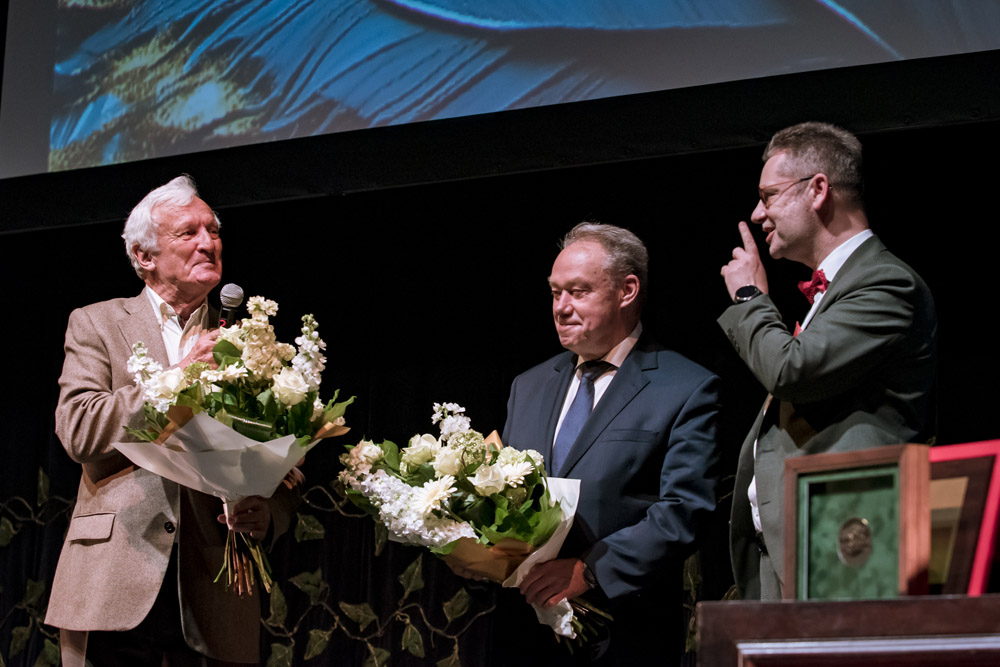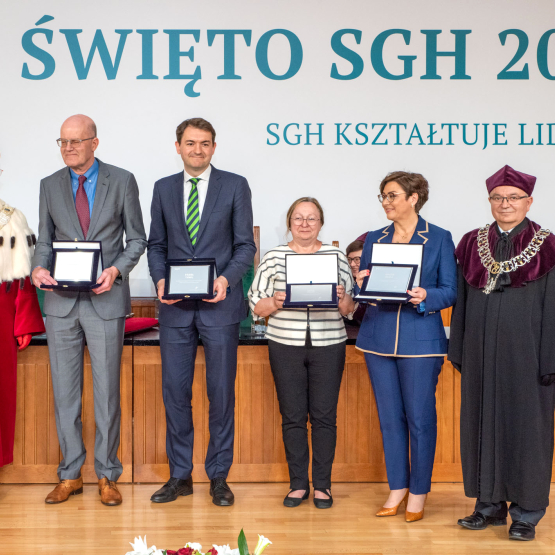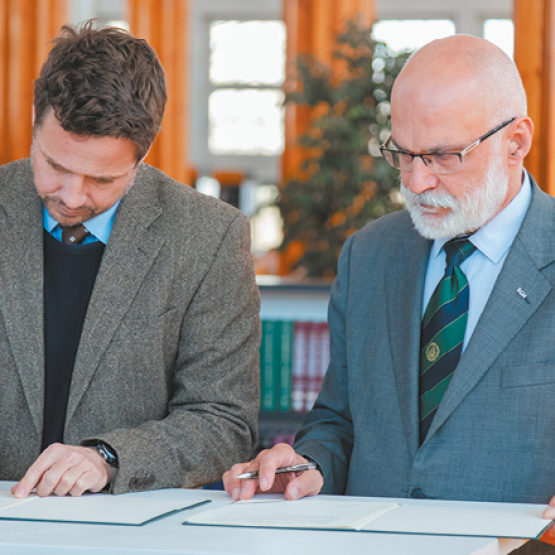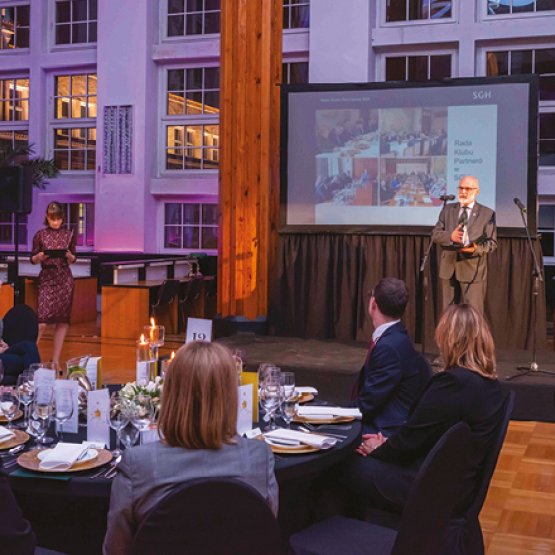SGH Partners Club – a model of university-business cooperation

Cooperation between universities and businesses is one of the pillars of strategy, as well as an area that every day faces new challenges in a turbulent environment. In this relationship, the university has always emphasized the participation and role of not two, but three parties: the university, the business organizations and the students.
The mission of SGH is to shape leaders, which means that our focus is not only on the educational aspect, but also on developing soft skills, building attitudes of social responsibility and creating an image. In this regard, the support of the business environment is invaluable. Who, if not them, knows best what challenges young SGH graduates will have to face?
SGH PARTNERS CLUB
The triumvirate of cooperation in the form of the SGH Partners Club - as this project is called, has been ongoing since 1998, when we started writing this story together. The aim of the Club is to effectively use the resources and the potential possessed by the university and its partners by combining the achievements of science and education with rich practical experience. SGH Partners Club is not just an “organization” that brings together the business environment, it is not merely about being university partners. Primarily, it is about the people who design and implement strategies together every day. It is an incredibly interconnected network of relationships and mutual influences, an ecosystem that skillfully combines the needs of students, expert knowledge of the academic community, and the expectations of a dynamically changing labour market with its multi-level and diverse nature. The past 25 years have seen many groundbreaking events in the history of both our country and the university and its environment. The memorable year 2000, joining the European Union, reforms, digital transformation, artificial intelligence at hand, the COVID-19 pandemic. These events witnessed successive generations of graduates entering the labour market, from generation X to Gen Z, from the Internet available for hours in internet cafes to unlimited contact and conducting business online 24 hours a day. The conditions and challenges have changed, the environment and people have changed, the idea behind SGH Partners Club has remained unchanged.
BACK TO THE PAST
In 1998, when prof. dr hab. Janina Jóźwiak, the then rector of SGH, signed the first “Partnership Agreement for the Development of SGH”, the Club was established by 12 members. 12 companies with a significant position in our market undertook the initiative of close cooperation, recognizing the need for information exchange between organizations from the world of economic practice, the business world, and SGH as an educational institution. The need to adapt the profile of SGH graduates to the needs of the economy and to support them in shaping their professional careers was recognized. Already then, they would wonder about the fate of the graduates: how it was unfolding, how quickly they were advancing, what positions they held, how they were directing their careers, what competencies they were looking for. Many years later, the System for Monitoring the Economic Fate of Graduates (ELA) would be created, the purpose of which presently is to provide verified, current and comprehensive information about the situation of graduates on the labour market. At the time when SGH Partners Club was starting its activity, cooperation with educational institutions was in the niche area of interest for modern enterprises, while in Western countries it had already been a long-standing practice, which could certainly inspire. ‘As far as I know, our actions aimed at establishing such relations with the economic environment on a partnership basis, based on such institutionalized and long-term horizon, are a relatively innovative solution in Poland’ - said prof. dr hab. Marian Geldner Vice-Rector for International Cooperation on 17 April 1998 in Programme I of the Polish Radio. Did the creators of SGH Partners Club expect that after 25 years they would be able to meet, shake hands and congratulate each other on a bold look into the future and perseverance in pursuing the original assumptions? Probably not. However, history shows that the visionary approach of Rector Jóźwiak and the support of the business environment, and most importantly - the adoption of a long-term cooperation strategy, brought results and consolidated the functioning of the Club. ‘There are many sentiments behind this decision. Most of the members of the Board of Bank Pekao SA are graduates of SGH. I am also a graduate. Being in these walls is very special. The benefits, which are very easily measurable, are obvious to us all. First of all, I have in mind the cooperation with those people who will soon leave the university walls. They are cooperating with us already as students. On our part, we provide them with various opportunities to get to know their future professional lives in the form of internships, both in the country and abroad. There are still many different types of other benefits associated with such cooperation. This cooperation takes place on various levels’ - emphasized member of the Board of Bank Pekao SA of the Pekao SA Group, director Mieczysław Skołożyński.
Companies that established the SGH Partners Club in 1998
- Asea Brown Boveri Sp. z o.o.
- A.T. Kearney Sp. z o.o.
- Bank Polska Kasa Opieki S.A. – Grupa Pekao S.A.
- Ernst&Young S.A.
- Gazeta Bankowa
- Giełda Papierów Wartościowych S.A.
- Henkel Polska S.A.
- Kraft Jacobs Suchard Polska Sp. z o.o.
- Petrochemia Płock S.A.
- Polski Bank Rozwoju S.A.
- Polskie Linie Lotnicze LOT S.A.
- Procter&Gamble Operations Polska S.A.
“EVERY TIME YOU SEE A BUSINESS THAT IS SUCCESSFUL, IT MEANS THAT SOMEONE ONCE MADE A COURAGEOUS DECISION.”
This is what one of the most important representatives and creators of modern thought of management, Peter Drucker said, and this is how the decision to establish SGH Partners Club can be summarized. The best proof of this are the companies that have invariably been supporting the university in its development for 25 years:
- Bank Pekao S.A.,
- EY,
- Warsaw Stock Exchange S.A.
- Procter&Gamble
“Some decisions after many years are considered good or very good, without a doubt this is one of the best we have made. Even though it was not my decision, I fully endorse it. At the moment, there are over half a thousand people in our ranks who have graduated from SGH…, and we cooperate with the university on many initiatives,” emphasized Paweł Tynel, partner and operational director of EY Poland, serving as the Ambassador of SGH. Every academic year, cooperation with businesses brings many benefits for both the university and the business world or the student community. It creates symbiotic relationships that promote the development of science, education, innovation, and the economy as a whole, even though on a daily basis we perceive this cooperation through the prism of organized events, conferences, or providing students with access to internships, practices, or development programmes. Indeed, cooperation with business gives them a chance to gain practical experience, establish contacts in the industry, and develop skills necessary for work. Companies can also use these programmes to get to know young talents and hire the best graduates. But cooperation with business also, and perhaps above all, enables the transfer of knowledge and technology. The university can also share its research, inventions and scientific achievements, which can be used by companies to develop products and services. On the other hand, businesses can convey to the university the latest trends and challenges, which helps in updating teaching and research programmes. Dr hab. prof. SGH Piotr Wachowiak, the current rector of SGH, frequently emphasizes the fact that business needs science and science needs business, and that cooperation is a necessity, because without it, it will be very difficult for the university to shape leaders in the right way. “I am very pleased that for 25 years the relations between us and the world of business have been getting closer and closer. But they are not only relations with businesses, but also with non-governmental organizations. …thanks to this we know what businesses expect and we are able to shape students better, prepare them better for the labour market,” - Rector Wachowiak emphasized.
COOPERATION WITH BUSINESS IN PRACTICE.
The exchange of experience, mutual inspiration, stimulating development, signalling programme needs are just some of the basic elements of cooperation. What contributes to the consolidation of the cooperation model is the involvement in the Study Practically programme. Employers acting as academic lecturers? Yes! In the educational offer of SGH, more and more subjects are carried out in cooperation with the university and its partners. For students this is a unique opportunity to enrich theoretical knowledge through work on business case studies and interaction with company representatives. Projects that are created as part of subject credits are often implemented in companies, and the students themselves can continue cooperation with a given company, receiving the opportunity for internships, participation in development programmes, or even employment. Both author’s subjects and guest lectures are forms of cooperation that definitely help in adapting teaching programmes to the needs of the present day labour market. This form of cooperation also allows for a better understanding of the current requirements and trends. Thanks to this, the university can adapt its teaching programmes, including the practical skills and knowledge necessary for the graduates to find employment. As a result, graduates are even better prepared to take up work and meet the expectations of employers.
Companies involved in the development and creation of educational programmes:
- BIK
- CITI
- EY
- Grupa LUX MED.
- Kearney
- L’Oreal
- Mastercard
- McKinsey
- P&G
- Point72
- Samsung
- Uniqa
The substantive involvement of businesses in the development of students’ competencies will be complemented by active participation in job fairs or the iconic Career Day event, which allows for the presentation of their current offer to interested students. Career planning is not an easy and obvious matter, not everyone who is in the first year of their studies must know exactly what they want to do, and which direction of studies is the right one for them. Therefore, at SGH students can individually arrange their study programmes. This is unique in the scale of our country. On the one hand, it is a great challenge for the university, but on the other – a great opportunity for students for personal development. Thanks to this approach, the student community can combine learning with getting to know business practice much more easily. In this entire ecosystem of planned careers and choice of development direction, a special role is played by career counsellors, who share their knowledge and experience on a daily basis during individual consultations, and during Career Day additionally support those interested with advice or CV consultation. Additionally, there is a photo point, where you can take your first professional photo, either for your CV or LinkedIn profile. All this, combined with advice on image styling and employer branding tips, allows for comprehensive support during the event in the first steps on the business floor.
GOING BEYOND THE SCHEME.
Joining SGH Partners Club also opens the way to some less obvious, innovative and often personalized forms of cooperation. The best example of this may be cooperation with Samsung, the original aim of which was to build a model of education which will allow students not only to understand the essence of challenges, but also to look for ways to face them. Cooperation and careful listening to the opinions of class participants resulted in the development of a model in which students prepare projects in teams that are diverse in terms of gender and nationality according to the Canvas model. Projects, presented in the form of startups, are evaluated by Samsung experts from the Business Development Department and the Research and Development Department. Such feedback from business allows for a better preparation of graduates for professional work. Another example is the “Skills of Tomorrow” educational programme implemented by SGH and Google. The programme was part of the broader #GrowwithGoogle initiative, and its goal was to increase the chances of young people in the labour market, with a particular emphasis on new technologies. It is worth emphasizing that the project was created for young people whose professional situation was worsened by the pandemic, and who now have to find an innovative career path for themselves.
Regardless of whether cooperation with business is based on the implementation of teaching programmes, organisation and participation in job fairs or innovative educational and development projects, its strength is cooperation itself, as well as mutually benefitting from the knowledge and experience of partners, also taking into account reverse mentoring. Students also teach businesses and universities, and seeing a competitive advantage in this relationship is a recipe for achieving further joint successes.”

prof. dr hab. Marian Geldner, dr hab. Zbigniew Dworzecki, prof. SGH, and dr hab. Piotr Wachowiak, prof. SGH
PATRYCJA DUTKIEWICZ, Director of the SGH Centre for Corporate Relations



